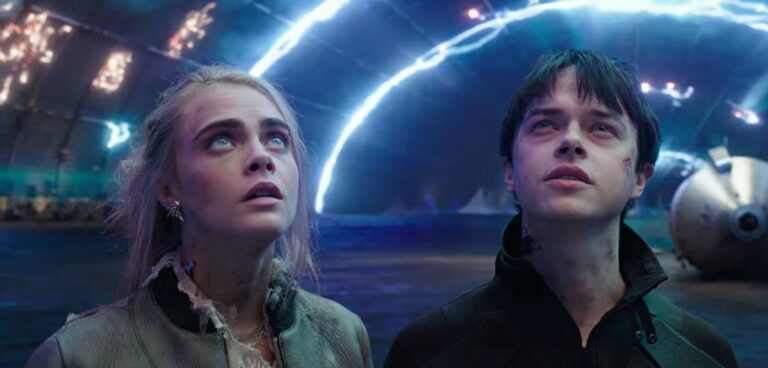Twenty years after The Fifth Element became a critical and commercial success, Luc Besson is back for another wildly imaginative sci-fi romp through a galaxy of eye-popping character and production design with Valerian and the City of a Thousand Planets. Based on the long-running French comic series Valerian et Laureline, which ran for more than four decades and influenced a host of sci-fi properties, the film follows a pair of intergalactic spies in the 28th century as they investigate a sinister threat aboard the colossal space station Alpha.
After a lengthy opening sequence that shows the progression of space travel and interstellar communication through several centuries (set to David Bowie’s “Space Oddity”), the film settles in on a gorgeous tropical planet, all blue skies and white beaches, where peaceful beings known as Pearls frolic in the sands while harvesting actual pearls that serve as some kind of frightening power source. War between other races rains destruction on their planet, and the entire species is wiped from existence – but not before sending some kind of telepathic communication to a cocky young Major.
Valerian (Dane DeHaan) isn’t quite sure what this message means – and he’ll have little time to decipher it, as he and partner Laureline (Cara Delevingne) are tasked with intercepting the illegal sale of an extremely rare and valuable artifact in the midst of a sprawling virtual marketplace, where the shops and their wares can only be glimpsed while wearing specialized equipment that turns the desert plain into a bustling center of commerce. The realization of this idea – and the insane series of events that follows when the mission goes awry – is the most thrilling sequence Valerian has to offer, and while the pace remains frenetic for the bulk of its 137-minute running time, the remaining action never comes close to this first setpiece.

Returning to their headquarters on Alpha, which boasts more than 8000 different species and provides the film with its titular 1000 planets, the duo are assigned to provide security for Commander Arun Filitt (Clive Owen), a tough-as-nails career military man with little patience for Valerian’s brash arrogance or Laureline’s smirking insolence. Filitt is concerned about a growing radioactive zone at the space station’s core, but before he can send a recon team to track down the source of the trouble, he and his crew are attacked by an unknown group of assailants, with Filitt being captured and whisked away by the intruders, leaving Valerian and Laureline in hot pursuit.
Up until this point, Valerian has remained marginally coherent, but all bets are off from this point forward as the film descends into sheer madness involving a painfully obvious government conspiracy, a trio of information-gathering aliens, an adorable creature that eats precious gems and replicates them in huge quantities (it’s never clear if the creature is secreting the duplicates, or pooping them out) and a shape-shifter named Bubble (Rihanna) that dances in a club owned by someone with the moniker Jolly the Pimp (Ethan Hawke). Through it all we’re bombarded with dialogue that feels lifted from the worst YA novel on the shelf, the bulk of it delivered with an almost impressive lack of emotion or inflection by DeHaan.
After being woefully miscast in this year’s The Cure for Wellness, one would hope that Valerian would offer a chance for the young actor to redeem himself. But the role of the charming rogue with a flair for action is clearly well outside DeHaan’s wheelhouse, and he instead turns in a performance that makes his work in Wellness feel Oscar-worthy by comparison, with barely a single line delivery coming across as genuine. His constant attempts to flirt with Laureline are far from endearing – in fact, they’re sort of creepy, as if Valerian is the drunk guy at the bar who keeps pestering the pretty girl who wants to be left alone.

Luckily, DeHaan is balanced out by a surprisingly charismatic Delevingne, who – much like the audience – has zero time for her partner’s childish bullshit. She plays Laureline with a fierce determination and carries herself as a fairly believable action star, which makes it all the more shameful when the film reduces her to a damsel in distress somewhere around the halfway point, a decision that feels completely out of place given what we’ve learned about the character up until that moment. From a dialogue perspective Delevingne fares slightly better than her co-star, but can’t escape a few clunkers, especially a dispassionate monologue about the true meaning of love.
If I were able to judge Valerian and the City of a Thousand Planets based solely on its striking environments, inspired alien designs and Besson’s commitment to constantly delivering jaw-dropping visuals, then I would happily give this film my highest recommendations. But with such frantic and tumultuous pacing, it rarely slows down enough for us to become invested in its characters – and on the rare occasion that it does, the actors are given almost nothing of substance to work with. If Besson had brought in another writer to punch up the script and ensure that it remained intelligible, and a different pair of actors had been cast in the leading roles, this might very well have turned into an instant sci-fi classic – but as it stands, it’s little more than a glorious, expensive mess that reeks of missed opportunities.
As wildly inventive as it is maddeningly incoherent, Luc Besson's $200 million sci-fi adventure is packed to the gills with stunning visuals and original ideas, but consistently held back by its weak script and woefully miscast leading man.
-
Score5

